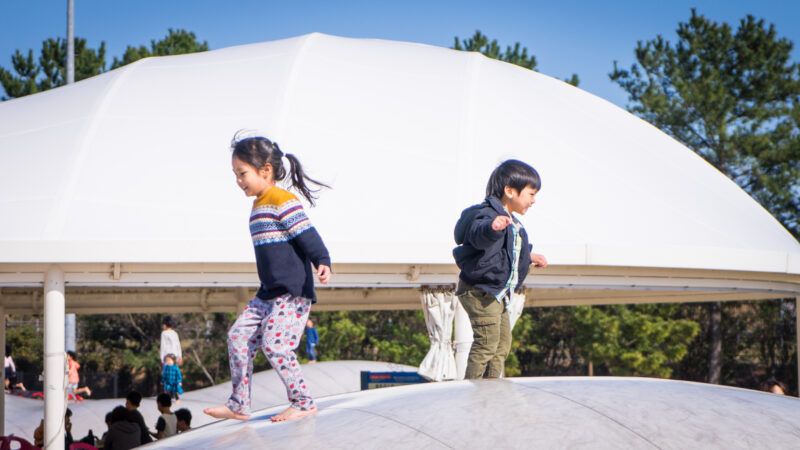Japanese Mapping App Helps Users Steer Clear of Loud Neighborhood Kids. But Why?
Experts speak of "society's growing intolerance for the sounds of children at play."

A popular map app in Japan is being used to alert users to places where kids are making noise or playing unsupervised.
A New York Times article about DQN Today quotes the website's description as a crowd-sourced guide where people—particularly potential home-buyers—can discover and avoid neighborhoods where "stupid parents… let their children play on roads and in parking lots."
The app's popularity has grown exponentially over the past year, perhaps due to the fact that a certain virus has lots of kids and adults home during the day, and lots of nerves fraying.
But the reporters, Tiffany May and Hisako Ueno, suggest that anger at the sound of frolic may have been gaining steam even before COVID-19 hit. They quote unnamed experts speaking of "society's growing intolerance for the sounds of children at play."
I wonder if this intolerance really is growing, and if so, why?
It could be that the sound of kids playing was once so common, no one noticed it, like highway traffic. But now that kids are spending so much more time inside, on screens, or at supervised activities—and therefore not roaming the streets—the kids who DO wander and play are outliers, drawing attention to themselves.
The reporters also point out that Japan is an aging society, and the oldsters might have grown unaccustomed to the sound of children playing. But aren't old folks just as likely to appreciate that sound?
Anyway, noise is such a difficult thing: Even happy sounds can be terribly annoying if you are trying to rest or work. The issue is so fraught that if this were simply an app about decibels, it wouldn't strike me as controversial at all.
What is disturbing is the underlying assumption that kids shouldn't be outside on their own. The site allows "references to unattended children playing on nearby roads, noting that it was ultimately the responsibility of parents and schools to supervise children at all times."
But it's not.
Yes, schools have a responsibility for the kids in their care. But it is not the responsibility of parents to supervise their kids at all times.
Children are humans, not possessions to be locked away. They are part of the fabric of life. And when parents think their little humans are ready for some independence, they are allowed to give this to them. That's how kids become comfortable in the world—and in their skins.
Ironically, this is something Japan seemed to understand better than most countries. Japanese first graders routinely walk to school by themselves. Do not wait at the schoolyard gate, the Savvy Tokyo website begs parents: "Remember your child's pride in not being a kindergartener anymore."
And then there's the popular Japanese show, My First Errand, which celebrates exactly what you'd expect. Except that the kids doing the errands are sometimes as young as three. (That's my guess, anyway: Here's the episode I watched.)
This is a country that trusts kids to do a whole lot on their own, and in fact, strangers along the way are expected to look out for them. Fantastic.
If this app starts to foster a culture that sees constant quiet as a right, kids will lose their freedom as will their parents. But there is the possibility that users could turn the app on its head: This is the place where all sorts of kids are playing outside on their own? Shouting? Running? Frolicking? Let's move our family there!
Call it the Free-Range Kids Finder.


Show Comments (49)